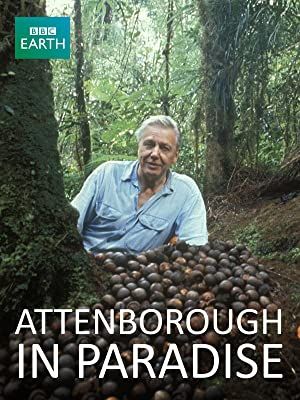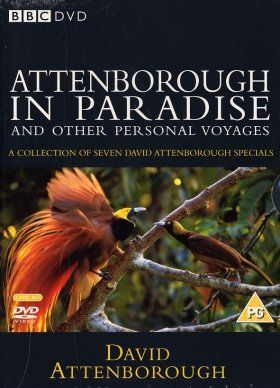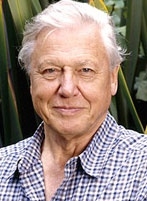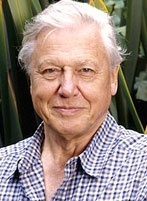Attenborough In Paradise
Attenborough In Paradise

David Attenborough - A paradicsom madarak földjén



Földünk legszínpompásabb és legkáprázatosabb madarai Új-Guineában élnek. A paradicsommadarak és lugasépítő madarak élete eddig elvétve került csak filmre, egyrészt mert félénk élőlények, másrészt pedig mert élőhelyül a távoli, eldugott területeket részesítik előnyben.
Ez az első film, amely e madarak teljes családját bemutatja. David Attenborough elkalauzolja a nézőt a búvóhelyekre, a fák koronái közé, és a mocsarakba, hogy együtt gyönyörködjünk pazar tollazatuk szépségében, páratlan udvarlási szokásaikban és lenyűgöző változatosságukban.
Cast

|
David Attenborough | |

|
Sir David Attenborough | Presenter |
Crew
| Director | Kate Broome |

|
| Writer | David Attenborough | |
| Producer | Paul Reddish | |
Episodes

David achieves a childhood ambition of finding and filming the Birds of Paradise described by Alfred Russel Wallace in his book, "The Malay Archipelago". He visits New Guinea and surrounding islands to track down these breath-takingly beautiful birds. Their plumage, colours and mating dances are spectacular. The environment is so benign that the female birds can build their nests and raise their young without the help of males, so the females choose a mate on the basis of his beauty and dancing ability alone. As a result, sexual selection has produced the most incredible variety of extravagant displays imaginable.

The central area of New Guinea was thought to be uninhabited until aerial photographs showed signs of human habitation. David accompanies an expedition into the interior to find and make contact with these people and map the area. He encounters tree kangaroos, an echidna, goura pigeons (another fabulously beautiful bird), an emerald tree python and leeches along the way. When they find a house, they don't hesitate to break in and rifle through the contents. When they eventually find people, they try to get them interested in trading beads and salt for food. They have limited success but then the people disappear - possibly (David feels) pushed too far too fast.

A carved wooden idol that David purchased in a New York auction room is traced back to its origin: Easter Island. It was cheap because the seller probably believed it was a forgery. But during the course of this programme its whole history is discovered: carved on Easter Island while there was still wood of the toromiro tree (now extinct on the island), to represent the god Makemake, traded with the crew of captain Cook's ship, transported to Tahiti, probably traded by the Tahitians with the crew of an American whaling ship and ended up in the US.

This time the birds are in Australia and New Guinea. Like the Birds of Paradise, Bowerbird females build their nests and raise their young alone so the male has all day to gather his treasures and create his bower. There seems to be a bowerbird rule: the more elaborate the bower the plainer the bird - the simpler the bower, the more vivid the plumage. David mischievously moves a leaf or a piece of lichen to see what the bird will do, then moves away. The bird flies back scoldingly and fussily returns his artistic display to its former perfection. Fascinating.

This natural history of music begins with David playing the piano (rather well, to my untrained ear). Searching for the origins of human music, he traces its connections to the musical sounds that other animals make: the beauty of the wolf's howl, the complexity of the bat's cry, the deep rumble of the elephant's signals, the acoustically sophisticated sounds the dolphin produces and the songs of whales and birds. Why do these animals produce this amazing variety of sounds? It's all tied up with sex and territory.

This programme takes a long and extremely entertaining look at David's career in television, from his earliest application for a job with BBC radio, which resulted in a job as Production Assistant for BBC television, then working on a series called Zoo Quest (first working behind the camera team and then in front of it), his job as head of BBC2 from its black and white beginnings through the introduction of colour, his elevation to BBC Director of Programmes where they were kind enough to let him out of his suit every now and then to go and be intrepid, his rejection of the job of BBC Director General so that he could go and do "Life on Earth" instead and .... so on.

Amber washed up on the shores of the Baltic Sea was given to David when he was 12 year old. He goes there to find out what that piece of amber has to tell about life in the forest where it bled from some sort of pine tree, trapping a community of insects as it oozed down the bark. Then a trip to the Dominican Republic, where amber reveals astonishing details about life up to 150 million years ago. In addition to insects, amber traps things like lizards, tadpoles, mammal hairs and seeds. Some of the perfectly preserved creatures have been scanned, X rayed and tested for traces of DNA. The stories they tell are quite remarkable.
Ben Fogle joins an expedition across Antarctica to find Captain Scott's hut, frozen in time for a century. The hut was built to support Scott's 1911 attempt to be first to the South Pole, and was later abandoned together with ten thousand personal, everyday and scientific items. Ben uncovers the hut and its contents, finding new information about his hero Scott and his famously tragic expedition. Scott's diaries are read by Kenneth Branagh.
Personal
| Location | HDD 01 |
|---|---|
| Quantity | 1 |
| Seen | |
| Added Date | Jul 01, 2014 18:36:26 |
| Modified Date | Feb 18, 2023 14:37:21 |


 English
English  Nederlands
Nederlands  Deutsch
Deutsch  Français
Français  Español
Español  Magyar
Magyar  српски
српски  Dansk
Dansk  Svenska
Svenska  Slovenčina
Slovenčina  Português
Português  Movie Cloud
Movie Cloud Book Cloud
Book Cloud Music Cloud
Music Cloud Comic Cloud
Comic Cloud Game Cloud
Game Cloud